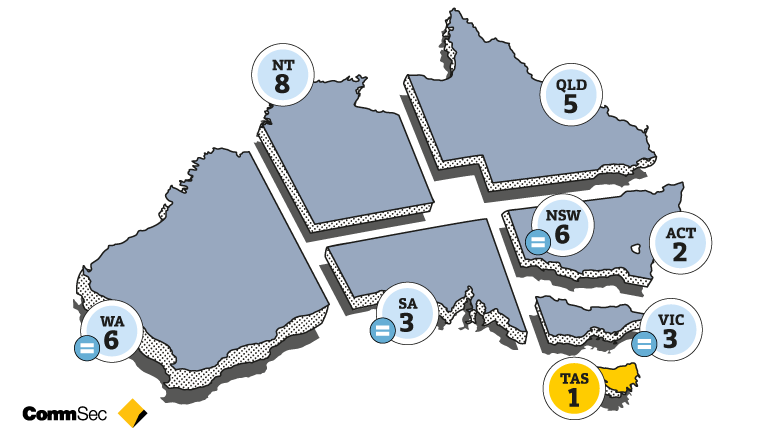Monthly Household Spending Intentions – February 2021

Each month, analysis by CBA’s Global Economic and Markets Research team provides an early indication of spending trends across seven key household sectors in Australia. In addition to home buying, the series covers around 55 per cent of Australia’s total consumer spend across; retail, travel, education, entertainment, motor vehicles, and health and fitness.
Home Buying Intentions
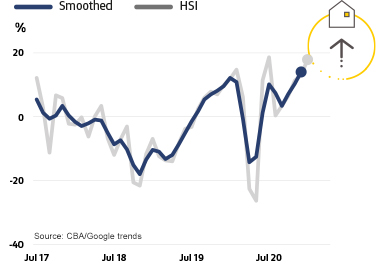
- Home buying spending intentions rose further in February, with the smoothed series reaching its highest level since the start of the HSI in 2015. Both home loan applications and Google searches were up on the month and well up on February 2020 levels.
- We continue to expect the home buying market to be a key source of support for the Australian economy in 2021 – driven largely by the very low level of interest rates.
- As we stated in last month’s HSI, residential property prices in Australia are expected to be up 8% in 2021 and 6% in 2022, with house prices expected to be 9% higher this year.
Retail Spending Intentions
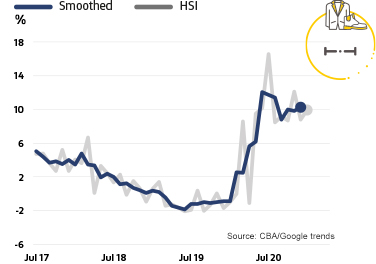
- Retail spending intentions softened in February. While actual retail spending in February 2021 was stronger than the same time last year, Google searches were noticeably softer.
- The year to February 2021 saw strong increases in spending on clothing, including uniforms, grocery stores & supermarkets, department stores, furniture stores, paint & hardware stores, jewellery & watch stores, luggage & leather goods, cosmetic stores, digital apps, electronic stores, florists, hobby & toy stores, pet shops and record stores.
- Some weakness was evident in spending on dry cleaners, tailors and duty free stores.
Travel Spending Intentions
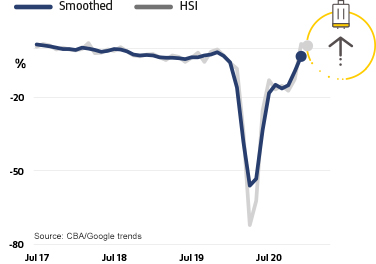
- Travel spending intentions moved largely sideways in February, consolidating recent gains as COVID-19 restrictions were largely lifted.
- For the month of February, Google searches related to Travel increased further (after increasing in January), while actual spending was down on the month and down relative to February last year.
- For February 2021, the largest annual increases in travel related spending were for spending on camper, recreational trailer dealers and trailer parks & camp grounds.
- Weakness is still evident in spending on airlines, cruise ships, hotels & motels, timeshares, travel agents, car rentals and bus lines. We may see a boost in coming months due to half-price flights being offered.
Health & Fitness Spending Intentions
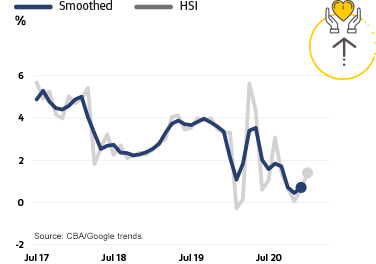
- Health & Fitness spending intentions jumped higher in February, with a solid increase in actual spending more than offsetting a decline in Google searches.
- Spending activity in health was up in February 2021 vs February last year for; ambulance services (not necessarily a good thing), chiropractors, dentists, doctors & physicians, optometrists and podiatrists.
- Spending activity in the fitness space showed solid improvement in bicycle shops – sales and service, golf courses and sporting goods stores. The major source of weakness remains commercial/ professional sports clubs and promotions
Entertainment Spending Intentions
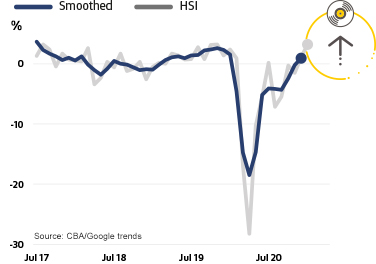
- Entertainment spending intentions continued to improve in trend terms in February, after solid gains in previous months.
- The strongest areas of entertainment spending on an annual rate in February included; on-premise and off-premise alcohol, eating out & restaurants, take away meals, boat rentals, bowling alleys, pay TV services, digital books, movies & music and music stores.
- Weakness remains evident in spending on billiard and pool establishments, dance halls & studios, movie theatres, live musical theatres and video arcades.
Education Spending Intentions
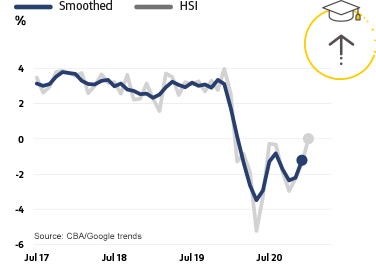
- Education spending intentions improved further in February 2021. Google searches were up sharply in February, although still well down on February 2020.
- In terms of transaction value, education spending was down in February 2021 against February last year. While spending was up for correspondence schools, spending value was down for business & secretarial schools, colleges & universities, elementary & secondary schools and trade & vocational schools.
- In terms of transaction quantity, February 2021 saw notable increases relative to February 2020 in spending on correspondence schools and elementary & secondary schools.
Motor Vehicle Spending Intentions
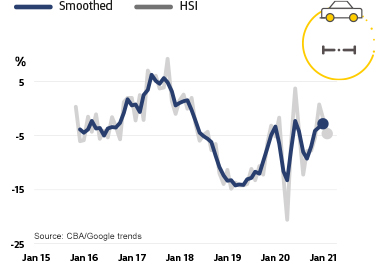
- Motor Vehicle spending intentions moved largely sideways in February 2021.
- February 2021 saw slightly lower levels, compared with February 2020, for Google searches and applications for motor vehicle loans.
- The ongoing improvement in the housing market is expected, however, to support the outlook for motor vehicle spending. Working against this trend is the increasing shift to work-from-home.
Notes for Editors:
About our monthly Household Spending Intentions series
The HSI series offers a forward-looking view by analysing actual customer behaviour from CBA’s transactions data, along with household search activity from Google Trends.
The approach focuses on Australian households and their spending intentions. Near real-time spending readings from CBA’s household transactions data was combined with relevant search information from Google Trends to map the data results on consumer spending. Households are the dominant part of the economy and drive much of its activity and volatility, and this combination adds to insights on prospective household spending trends in the Australian economy.
Google Trends is a publically available service that enables people to explore search trends around the world. These searches provide insights into what consumers are doing/researching on the Internet and what their spending intentions are.
CBA’s Household Spending Intentions series is published on the third Tuesday of every month. To find out more about the series, visit www.commbank.com.au/spendingintentions.
Disclaimer
The information contained in this media release is published solely for informational purposes and provides general market-related information, and is not intended to be an investment research report. This media release has been prepared without taking into account your objectives, financial situation (including the capacity to bear loss), knowledge, experience or needs. Before acting on the information in this media release, you should consider its appropriateness and, if necessary, seek appropriate professional or financial advice, including tax and legal advice. The data used in this media release is a combination of ‘CBA transaction data’ and Google Trends™ data. Google Trends is a trademark of Google LLC. The term ‘CBA transaction data’ refers to the proprietary data of the Commonwealth Bank of Australia ("the Bank") that is sourced from the Bank’s internal systems and may include, but is not limited to, credit card transaction data, merchant facility transaction data and applications for credit. The Bank takes reasonable steps to ensure that its proprietary data is accurate and that any opinions, conclusions or recommendations are reasonably held, or are made at the time of compilation of this media release. As the statistics take into account only the Bank’s data, no representation or warranty is made as to the completeness of the data and it may not reflect all trends in the market. All customer data used or represented in this media release is anonymous and aggregated before analysis, and is used and disclosed in accordance with the Bank’s Privacy Policy Statement.
Commonwealth Bank of Australia ABN 48 123 123 124 AFSL 234945.
Full disclosures and disclaimers.

